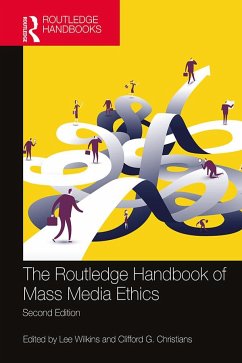
Understanding Digital Ethics
Cases and Contexts
Versandkostenfrei!
Versandfertig in 6-10 Tagen
43,99 €
inkl. MwSt.
Weitere Ausgaben:

PAYBACK Punkte
22 °P sammeln!
Rapid changes in technology and the growing use of electronic media signal a need for understanding both clear and subtle ethical and social implications of the digital, and of specific digital technologies. Understanding Digital Ethics: Cases and Contexts is the first book to offer a philosophically grounded examination of digital ethics and its moral implications. Divided into three clear parts, the authors discuss and explain the following key topics:- Becoming literate in digital ethics- Moral viewpoints in digital contexts- Motivating action in digital ethics- Speed and scope of digital i...
Rapid changes in technology and the growing use of electronic media signal a need for understanding both clear and subtle ethical and social implications of the digital, and of specific digital technologies. Understanding Digital Ethics: Cases and Contexts is the first book to offer a philosophically grounded examination of digital ethics and its moral implications. Divided into three clear parts, the authors discuss and explain the following key topics:
- Becoming literate in digital ethics
- Moral viewpoints in digital contexts
- Motivating action in digital ethics
- Speed and scope of digital information
- Moral algorithms and ethical machines
- The digital and the human
- Digital relations and empathy machines
- Agents, autonomy, and action
- Digital and ethical activism.
The book includes cases and examples that explore the ethical implications of digital hardware and software includingvideogames, social media platforms, autonomous vehicles, robots, voice-enabled personal assistants, smartphones, artificially intelligent chatbots, military drones, and more.
Understanding Digital Ethics is essential reading for students and scholars of philosophical ethics, those working on topics related to digital technology and digital/moral literacy, and practitioners in related fields.
- Becoming literate in digital ethics
- Moral viewpoints in digital contexts
- Motivating action in digital ethics
- Speed and scope of digital information
- Moral algorithms and ethical machines
- The digital and the human
- Digital relations and empathy machines
- Agents, autonomy, and action
- Digital and ethical activism.
The book includes cases and examples that explore the ethical implications of digital hardware and software includingvideogames, social media platforms, autonomous vehicles, robots, voice-enabled personal assistants, smartphones, artificially intelligent chatbots, military drones, and more.
Understanding Digital Ethics is essential reading for students and scholars of philosophical ethics, those working on topics related to digital technology and digital/moral literacy, and practitioners in related fields.














